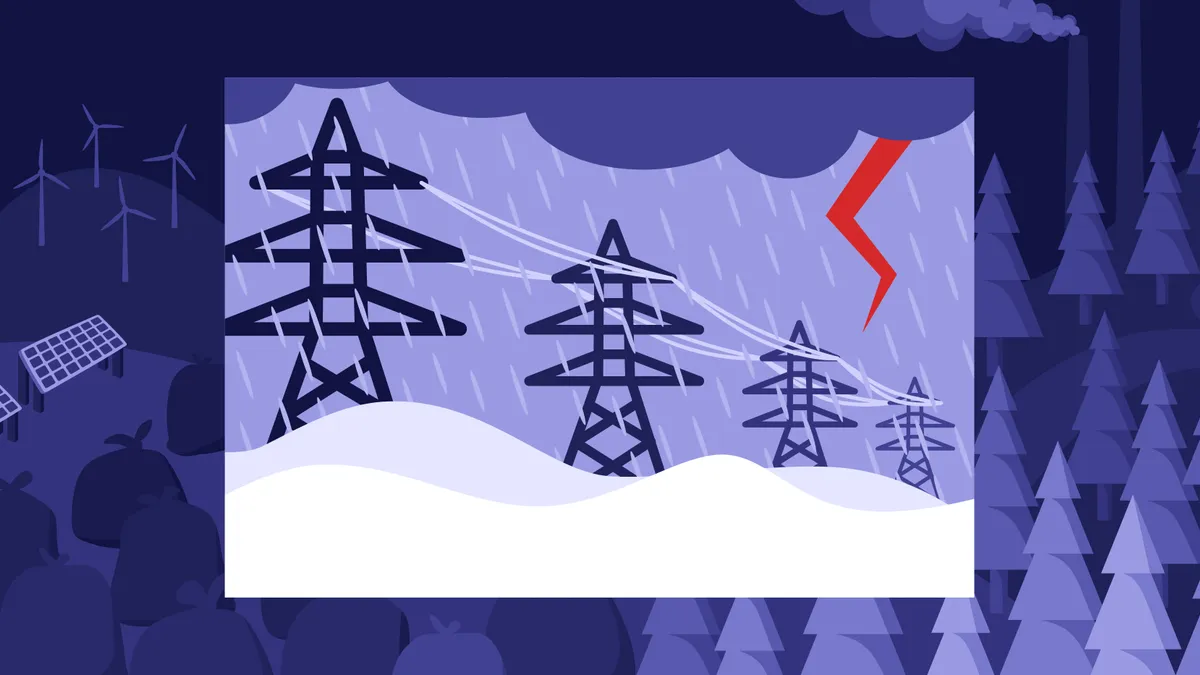Dive Brief:
- Federal regulators on Tuesday opened an inquiry into bulk power system operations following a polar vortex across the middle of the country that left millions of people without electricity.
- Texas Gov. Greg Abbott, R, also directed his state's legislature to investigate the Electric Reliability Council of Texas (ERCOT) on Tuesday following the outages. The Federal Energy Regulatory Commission and the North American Electric Reliability Corporation (NERC) will investigate all regions impacted by the cold snap, including ERCOT, the Southwest Power Pool (SPP) and Midcontinent Independent System Operator (MISO).
- Increased demand from extreme cold weather, limited gas supplies and frozen equipment at thermal plants were the primary causes of rolling blackouts triggered across ERCOT, according to officials. Approximately 45,000 MW of generation was offline as of Tuesday afternoon, including just under 30,000 MW of thermal generation and 16,000 MW of renewables, according to ERCOT officials.
Dive Insight:
An "unprecedented" snow storm and freeze across the Midwest, Oklahoma and Texas early this week led to a spike in demand Sunday night that corresponded with a drop in supply early this week. As a result, ERCOT, SPP and MISO directed generators to begin rolling blackouts starting Sunday night in order to avoid "catastrophic" system impacts, Dan Woodfin, ERCOT senior director of system operations, told reporters Tuesday.
Most of the generation that tripped offline Tuesday, primarily in Texas' ERCOT region, was caused by issues in the natural gas supply system, said Woodfin — several pipes and wellheads froze, leaving the plants fuel-constrained. This led to about half ERCOT's natural gas fleet and about 30% of its total capacity to come offline, Jesse Jenkins, a professor of macro-energy systems engineering at Princeton found. Iced wind turbines led to a loss of capacity as well, though only from about a third of the 16,000 MW offline, said Woodfin, because ERCOT assumes about 30% capacity from wind generation.
"The primary issues now appear to be lack of fuel delivery to natural gas units, both due to frozen gas lines and to supply prioritization for gas heating demand over electric generators," said Jenkins in a tweet. "Some wind generators out due to icing too, but that's second order by far."
FERC, NERC and Texas' governor all called for an investigation into the outages Tuesday, as ERCOT struggled to predict when outages would end. Although ERCOT is primarily governed by the Public Utility Commission of Texas and the Texas legislature, FERC still has national authority when it comes to ensuring reliability.
FERC and NERC will "formally begin" the inquiry within the next few days, once ERCOT is able to restore power, regulators said in a statement. Gov. Abbot declared the operation of ERCOT an emergency item, directing the legislature to "ensure Texans never again experience power outages on the scale they have seen over the past several days."
"This is unacceptable," he said in a statement. "Reviewing the preparations and decisions by ERCOT is an emergency item so we can get a full picture of what caused this problem and find long-term solutions."
ERCOT CEO Bill Magness told reporters the governor's decision to investigate the events that led up to the rolling blackouts was "completely appropriate."
"We're not surprised by it. We'd be surprised if they didn't, given the importance of this issue," he said. "We're happy to participate in that and we'll cooperate and hopefully be very involved in whatever way we're asked to."
The grid operator was unable to provide an estimate on when electricity would be fully restored across its territory. The "wildcard" was at what point ERCOT would be able to get its supply and demand back in balance by getting more generation online, said Magness.
"What we saw this week is a historic, unprecedented weather event that took the demand side of the grid balance equation to skyrocket," he said. "We broke the prior winter record for ERCOT by a lot. Basically shattered the record. ... We saw ... more demand than we've ever seen in the winter and almost as much as we see at the peak of our summer."
Peak demand for a 2026/2027 planning scenario was estimated at 67,512 MW, based on "normal weather" conditions, Jenkins found, while demand Monday night hit a record-breaking 69,150 MW.
SPP had restored all load as of Tuesday morning, and downgraded its emergency energy alert to a Level 1 emergency Tuesday afternoon.
MISO directed its South Region members to encourage power conservation on Monday, which led to some power interruptions across Texas, Louisiana and Illinois, spokesperson Brandon Morris said in an email. "The cause was transmission constraints and generation outages and most of those outages have been restored. The unseasonably cold temperatures experienced in the South have created significantly challenges across generation/fuel types as well as transmission lines."














